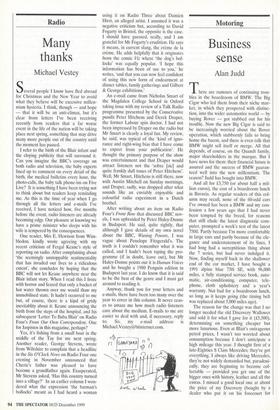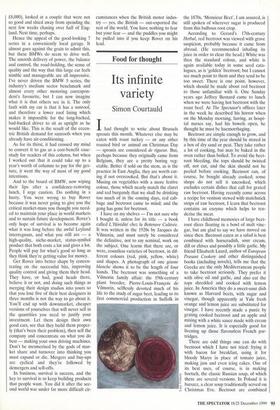Motoring
Business sense
Alan Judd
And all for £3,750 (or about half a mil- lion euros), the cost of a boardroom lunch in Bavaria. As regular readers of this col- umn may recall, none of the 60-odd cars I've owned has been a BMW and my con- fession a few years ago that I had never been tempted by the breed, for reasons that still elude the latest diagnostic com- puter, prompted a week's test of the latest 750n. Partly because I'm more comfortable in large cars and partly because of the ele- gance and understatement of its lines, I had long had a surreptitious thing about the 7 series, but had never indulged it. Now, finding myself back in the shallower end of the car market, I have bought a 1991 alpine blue 730i SE, with 96,000 miles, a fully stamped service book, auto- matic, air-conditioning, computer, tele- phone, cloth upholstery and a year's warranty. Not bad for a boardroom lunch, so long as it keeps going (the timing belt was replaced about 5,000 miles ago).
The reason for the change was that I no longer needed the old Discovery Wallower and sold it for what I gave for it (£5,500), determining on something cheaper but more luxurious. Even at Blair's outrageous petrol prices, I wasn't too worried about consumption because I don't anticipate a high mileage this year. I thought first of a late-Eighties S Class Mercedes; they've got everything. I always like driving Mercedes, they're not widely demanded but, paradoxi- cally, they are beginning to become col- lectable — provided you get one of the bigger ones with history, leather and all the extras. I missed a good local one at about the price of my Discovery (bought by a dealer who put it on his forecourt for £8,000), looked at a couple that were not so good and shied away from spending the next few weeks chasing over half of Eng- land. Next time, perhaps.
Hence the appeal of the good-looking 7 series in a conveniently local garage. It almost goes against the grain to admit this, but these BMWs do seem to drive well. The smooth delivery of power, the balance and control, the road-holding, the sense of quality and the way that this large car feels nimble and manageable are all impressive. I've never driven the BMW 5 series, the industry's medium sector benchmark and almost every other motoring correspon- dent's favourite, but I can now imagine what it is that others see in it. The only fault with my car is that it has a sunroof, and therefore a lower roof lining which makes it impossible for the long-backed, bad-backed driver to sit as upright as he would like. This is the result of the eccen- tric British demand for sunroofs when you already have air-conditioning.
As for its thirst, it had crossed my mind to convert it to gas as a cost-benefit case- study for readers of this column, but when I worked out that it could take up to a year's worth of columns to pay for the ges- ture, it went the way of most of my good intentions.
And to the board of BMW, now wiping their lips after a confidence-restoring lunch, I urge caution. Do nothing in a hurry. You were wrong to buy Rover because it was never going to give you the critical market-mass you thought you need- ed to maintain your place in world markets and to sustain future development. Rover's only hope of survival is to become again what it was long before the awful Leyland interregnum, and what you still are — a high-quality, niche-market, status-symbol product that both costs a lot and gives a lot. People will pay for what's good so long as they think they're getting value for money. Get Rover into better shape by concen- trating on the successful bits, improving quality control and giving them their head. They have, or had, good heads there, believe it or not, and doing such things as merging their design studios into yours so that you lose five of their best designers in three months is not the way to go about it. You'll end up with downmarket, cheaper versions of yourselves that will never sell in the quantities you need to justify your investment. Let them design their own good cars, see that they build them proper- ly (that's been their problem), then sell the company and concentrate on what you do best — malting your own driving machines. Don't be mesmerised by the gods of mar- ket share and turnover into thinking you must expand or die. Mergers and buy-ups are cyclical and they're followed by demergers and sell-offs.
In business, survival is success, and the key to survival is to keep building products that people want. You did it after the sec- ond world war under far more difficult cir- cumstances when the British motor indus- try — yes, the British — out-exported the rest of the world. You have nothing to fear but your fear — and the puddles you might be pulled into if you keep Rover on his lead.























































































































 Previous page
Previous page